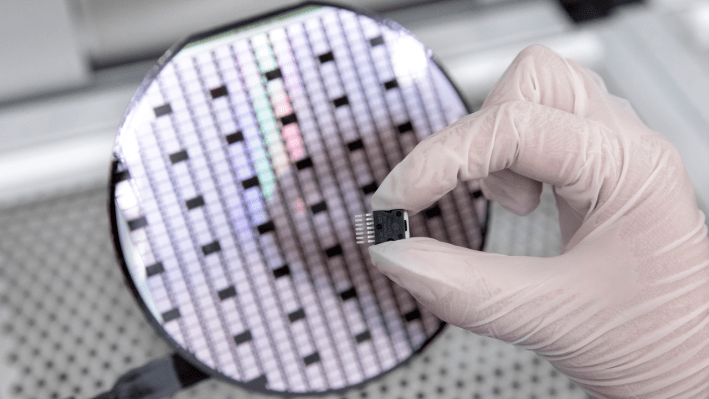The United States Department of Commerce Monday proposed investing as much as $6.6 billion to fund a third Taiwan Semiconductor Manufacturing Company Limited (TSMC) fab in Arizona. The funding would arrive by way of the CHIPS and Science Act, in a bid to foster more domestic semiconductor production.
The move represents a broader push to bring more manufacturing to the U.S., but unspoken in the fanfare around today’s announcement is the potential escalation of tensions with China.
The proposed fab is a greenfield facility — meaning it’s custom-built from the ground up. It would focus on 2nm (“or newer”) architectures, designed for a slew of different applications, including computing, 5G/6G wireless communications and, of course, AI. TSMC Arizona — the subsidiary behind the proposed construction — has stated that it will build the facility before the end of the decade.
The chipmaker says construction will bring more than 20,000 jobs to the area, while forecasting around 6,000 manufacturing roles once the facility is operational.
Localized manufacturing has been a key focus for the Biden administration, as the COVID-19 pandemic highlighted vulnerabilities in the global supply chain. Those issues have been exacerbated by the ubiquity of silicon in our daily lives. Those numbers are only growing. According to a semiconductor trade association, global sales hit $47.6 billion in January 2024 — marking more than a 15% increase over the prior year.
“TSMC’s renewed commitment to the United States, and its investment in Arizona represent a broader story for semiconductor manufacturing that’s made in America and with the strong support of America’s leading technology firms to build the products we rely on every day,” President Biden said in a release tied to the news.
Much of the administration’s funding has focused on U.S. firms like Intel, which was targeted with its own $8.5 billion proposal toward the end of March. TSMC, however, is an 800-pound gorilla, both in terms of market share and technological advances. The firm has, however, found itself in the middle of looming geopolitical concerns. The United States and allies would be at a massive disadvantage should China seize control of Taiwan and its manufacturing capabilities.
TSMC has its own concerns over such a scenario. For one thing, the company’s two biggest customers — Apple and Nvidia — are American. For another, some in the U.S. have even gone so far as suggesting the country bomb chipmakers, should such things come to pass.
“We should make it very clear to the Chinese, if you invade Taiwan, we will blow up TSMC,” Massachusetts Congressman Seth Moulton said at an event back in May.
The Democratic representative has since distanced himself from the clip, stating that it was selectively edited by the Chinese Communist Party. However, he is hardly alone in floating such suggestions. Earlier the same year, former Trump National Security Advisor Robert O’Brien stated, “The United States and its allies are never going to let those factories fall into Chinese hands,” suggesting the country destroy the factories. O’Brien went so far as comparing such hypothetical actions to Britain’s actions during the Second World War.
Such saber rattling has drawn international criticism. Beyond the clear ethical questions, such an evasive action would have a massive impact on the global economy. In addition to Apple and Nvidia, TSMC also serves Sony, MediaTek, AMD, Qualcomm and Broadcom, among others.
For all the money the United States government continues to invest, Intel is simply playing catch-up to TSMC’s multiyear technological head start. TSMC makes around 90% of the world’s most advanced chips. For now, the best defense the U.S. has against future disruptions — be they pandemics or geopolitical conflicts — is diversification of supply. That applies to where and by whom components are manufactured.
While the architects of the CHIPS and Science Act would no doubt love to elevate U.S. companies manufacturing domestically, ours is a global economy. TSMC is certainly aware of the value of distributing the supply chain.
“The proposed funding from the CHIPS and Science Act would provide TSMC the opportunity to make this unprecedented investment and to offer our foundry service of the most advanced manufacturing technologies in the United States,” the chip giant’s chairman Mark Liu said in a release tied to the news. “Our U.S. operations allow us to better support our U.S. customers, which include several of the world’s leading technology companies. Our U.S. operations will also expand our capability to trailblaze future advancements in semiconductor technology.”
Among those who monitor U.S.-China relations, the upcoming presidential election could mark a key turning point. Former President Trump dramatically escalated trade tensions, for one. Huawei’s addition to the entity list marked a massive setback for the mobile firm, as it lost access to key components from American companies like Google and Qualcomm.
Speaking last year, Biden’s now-former U.S. Director of National Intelligence Avril Haines noted that if a U.S. invasion halts TSMC’s Taiwan-based product, “it will have an enormous global financial impact that I think runs somewhere between $600 billion to $1 trillion on an annual basis for the first few years.”
